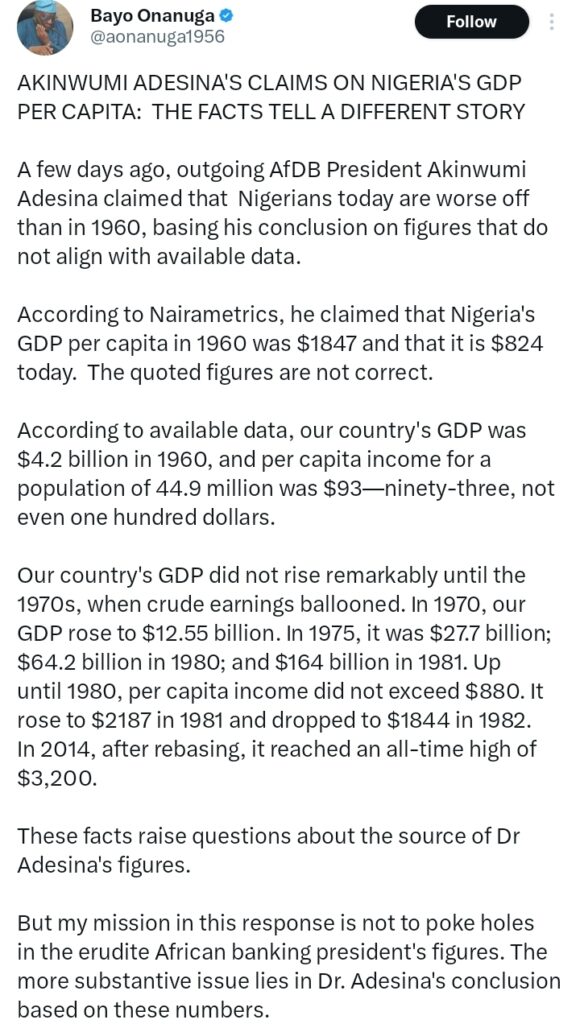The Presidency has countered claims made by outgoing African Development Bank (AfDB) President, Dr. Akinwumi Adesina, who recently stated that Nigerians are worse off today than they were in 1960.
In a detailed post on X late Sunday issued by Bayo Onanuga, Special Adviser to the President on Information and Strategy, the government dismissed Adesina’s assertions as “misleading” and based on “inaccurate data.”
Onanuga pointed out that Adesina had cited a questionable comparison of Nigeria’s Gross Domestic Product (GDP) per capita, reportedly claiming that it stood at $1,847 in 1960 compared to $824 today.
However, Onanuga insisted that “the quoted figures are not correct.”
“According to available data, our country’s GDP was $4.2 billion in 1960, and per capita income for a population of 44.9 million was $93—ninety-three, not even one hundred dollars,” he said.
READ ALSO: AfDB president Adesina visits Buhari, expresses gratitude for support during elections
Tracing Nigeria’s economic growth trajectory, Onanuga explained that significant GDP expansion did not occur until the 1970s when oil revenues surged.

He noted, “In 1970, our GDP rose to $12.55 billion. In 1975, it was $27.7 billion; $64.2 billion in 1980; and $164 billion in 1981. Up until 1980, per capita income did not exceed $880. It rose to $2,187 in 1981 and dropped to $1,844 in 1982. In 2014, after rebasing, it reached an all-time high of $3,200.”
Challenging the methodology behind Adesina’s conclusion, Onanuga emphasized that GDP per capita alone is a flawed tool for measuring citizens’ well-being.
“Dr. Adesina should know that GDP per capita is not the only criterion used to determine whether people live better lives now than in the past. Indeed, it is a poor tool for assessing living standards,” he stated.
He added that GDP fails to capture vital indicators such as income distribution, informal economic activities, subsistence farming, and social welfare components like access to healthcare and education. “GDP masks many activities in a country’s economy,” Onanuga said. “It does not account for subsistence farming or income transfer from one family member to another.”
Drawing a sharp contrast between the Nigeria of 1960 and that of today, Onanuga asserted that the country has made measurable progress across several sectors.
“Compared with 1960, Nigeria today has more primary, secondary, and tertiary schools. We have more road networks and more medical facilities, private and public. We have phenomenal access to telephones. At Independence, we had 18,724 operational phone lines for a population of about 45 million. Over 200 million Nigerians now enjoy near-universal access to mobile phones and digital services,” he said.
He also cited the Nigerian informal economy as a major component that eludes traditional GDP calculations. “Whatever GDP figure NBS publishes may not capture our economy’s full depth and breadth if it fails to include the informal economy, which some pundits have said may even be more significant than the formal economy,” he added.
Referencing the initial skepticism of telecom giant Vodacom when it considered entering the Nigerian market in 1999 or 2000, Onanuga explained how GDP misjudgments can lead to erroneous conclusions.
“Its consultants, using the available GDP metrics, advised against it. They believed that Nigerians were too poor to afford GSM services. However, MTN and other companies that entered the market later proved them wrong,” he recounted.
“More than 20 years later, they are still laughing despite some setbacks in 2023 and 2024.”
Highlighting MTN’s recent success, Onanuga noted, “In its first-quarter results this year, MTN declared revenue of N1 trillion and an increase of 8.2 percent in subscriptions, which took the number of its voice and data users to 84 million. Does this MTN experience correlate with a country worse off than in 1960, when we had analogue telephones and the number of lines was fewer than 20,000?”
He concluded by asserting that Adesina’s position does not reflect Nigeria’s actual progress.“No objective observer can claim that Nigeria has not made progress since 1960,” Onanuga said.
“Today, as we await the NBS’s recalibration of our GDP, we can comfortably say without contradiction that it is at least 50 times, if not 100 times, more than it was at Independence.
“The rebuttal underscores the government’s intent to defend its record amid ongoing debates about economic hardship, poverty levels, and the broader state of the Nigerian economy.

